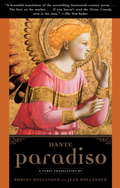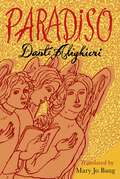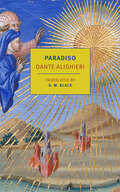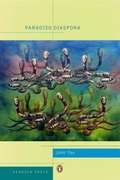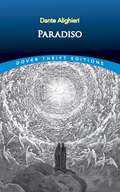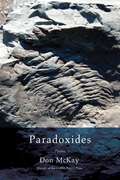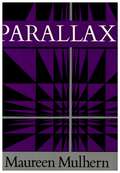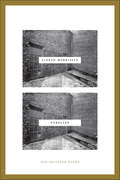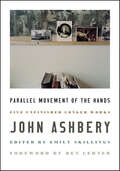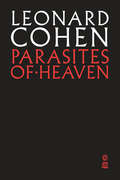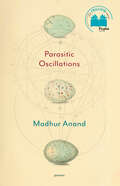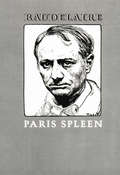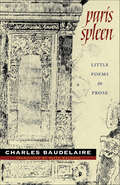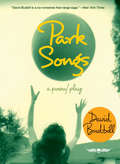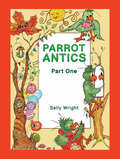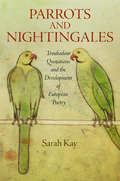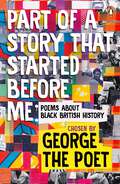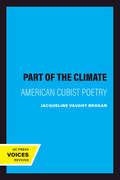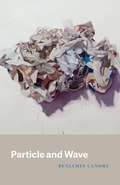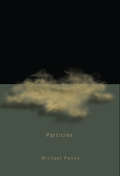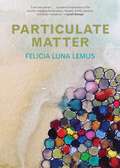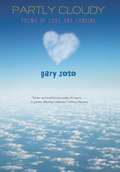- Table View
- List View
Paradiso
by DanteWith his journeys through Hell and Purgatory complete, Dante is at last led by his beloved Beatrice to Paradise. Where his experiences in the Inferno and Purgatorio were arduous and harrowing, this is a journey of comfort, revelation, and, above all, love-both romantic and divine. Robert Hollander is a Dante scholar of unmatched reputation and his wife, Jean, is an accomplished poet. Their verse translation with facing-page Italian combines maximum fidelity to Dante's text with the artistry necessary to reflect the original's virtuosity. They have produced the clearest, most accurate, and most readable translation of the three books of The Divine Comedy, with unsurpassable footnotes and introductions, likely to be a touchstone for generations to come.
Paradiso
by Dante AlighieriMary Jo Bang’s translation of Paradiso completes her groundbreaking new version of Dante’s masterpiece, begun with Inferno and continued with Purgatorio. In Paradiso, Dante has been purified by his climb up the seven terraces of Mount Purgatory, and now, led by the luminous Beatrice, he begins his ascent through the nine celestial spheres of heaven toward the Empyrean, the mind of God. Along the way, we meet the souls of the blessed—those at various proximities to God, but all existing within the bliss of heaven’s perfect order. Philosophically rich, spiritually resonant, Paradiso is a reckoning with justice and morality from a time of ethical questioning and political division much like our own.Bang’s translation is a revelation in its artistry, readability, and faithfulness to Dante’s ambition for an epic poem that dares to employ language and references recognizable to its readers. In her lyric style and her illuminating and generous notes, Bang has made The Divine Comedy for the twenty-first century.
Paradiso
by Dante AlighieriA new translation of the final part of Dante's Divine Comedy by a poet and psychoanalyst praised for his previous translation of Dante's Purgatorio.Paradiso brings The Divine Comedy to a virtuosic and visionary end. This final leg of Dante's journey from Hell into the presence of God is for many the most memorable stretch of the poem, a musical and mystical interweaving of mind and heart and transported sense that is unlike anything else in world literature. This new English rendering of Paradiso by the poet D. M. Black, whose Purgatorio won the 2022 National Translation Award in Poetry, re-creates this masterpiece with fidelity and clarity.Cleansed of sin after his grueling trek up Mount Purgatory, Dante's pilgrim sets out to explore the celestial spheres under the guidance of his childhood sweetheart and lifelong muse, Beatrice. As he moves from the moon to the planets to the Primum Mobile and beyond, encountering emperors, heroes, saints, members of his family, and various other redeemed sinners, he contemplates optics, angels, free will, mercy, and love. The transcendent actuality of bliss is ever more palpable as the poem unfolds, and yet in the background remains the carnage of history and the deforming bitterness of the human heart, not to be denied—Dante is nothing if not a realist—even in the supreme light of "the Love that moves the sun and all the stars."Written at a time of great political turmoil in Italy and great personal anxiety in Dante's life, Paradiso wrestles with many questions that have echoes in our own disturbing times. It is a book about the shape of the universe and how to find one's place within it, composed with inventive daring and linguistic ingenuity as Dante stretches language to its very limits, striving to make vivid and tangible the ineffable and sublime.
Paradiso Diaspora
by John YauAs the anagram of its title suggests, the poems, prose, lyrics, and memoir in John Yau's new collection focus on an inescapable duality. It is the duality of living in both painted gardens and in the shadows of historic events that sweep one along. Yau explores the language of telling, of biography, auto and otherwise, of landscapes that are simultaneously imaginary and real, of ways to enter and leave "the kingdom of poetry. " This is a book of displacements and unpredictable associations, of "last confessions" and "coming attractions," at once haunted and haunting.
Paradiso: Poema Di Dante (1787) (Dover Thrift Editions: Poetry)
by Dante AlighieriThe last great literary work of the Middle Ages and the first important book of the Renaissance, Dante's Divine Comedy culminates in this third and final section, Paradiso. The 14th-century allegory portrays a medieval perspective on the afterlife, tracing the poet's voyage across three realms — Hell, Purgatory, and Paradise — to investigate the concepts of sin, guilt, and redemption. Expressed in sublime verse, the trilogy concludes with this challenging and rewarding venture into the dwelling place of God, angels, and the souls of the faithful.Guided by Beatrice, the incarnation of beatific love, Dante undergoes an intellectual journey from doubt to faith. Beatrice instructs the poet in scholastic theology as they pass through the nine spheres of Paradise to the Empyrean, a realm of pure light in which the redeemed experience the bliss of God's immediate presence. This edition features the renowned translation by American poet Henry Wadsworth Longfellow and serves as a companion volume to the Dover editions of Inferno and Purgatorio.
Paradoxides
by Don MckayMulti-award-winning poet Don McKay returns with a startling collection of new poems, his first since his Griffin Poetry Prize winning book,Strike/Slip Don McKay is known, among other things, as Canada's foremost poet of the natural world. Readers have come to expect a playful extravagance in his poetry. Most recently, he has opened himself to the mysteries of geologic wonder. "Who needs ghosts when matter /nonchalantly haunts us," he writes. In his new book, perhaps his most stunning yet, it's fossils and deep time that provide the awe. The landscape of Newfoundland has taken his linguistic virtuosity even further, sharpened his wit, and given him a lyric energy that sometimes feels as if he's lifting the planet into song.
Parallax (Wesleyan New Poets)
by Maureen MulhernFirst edition. English author who emigrated to the United States in 1964. Author's first book.
Parallax: And Selected Poems
by Sinéad MorrisseyA T. S. Eliot Prize–winning collection from one of Ireland's major contemporary poetsPARALLAX: (Astron.) Apparent displacement, or difference in the apparent position, of an object, caused by actual change (or difference) of position of the point of observation. (OED)In Parallax Sinéad Morrissey documents what is caught, and what is lost, when houses and cityscapes, servants and saboteurs ("the different people who lived in sepia"), are arrested in time by photography (or poetry), subjected to the authority of a particular perspective. Assured and disquieting, Morrissey's poems explore the paradoxes in what is seen, read, and misread in the surfaces of the presented world.
Parallel Movement of the Hands: Five Unfinished Longer Works
by John AshberyA stunning collection of work from beloved poet John Ashbery, his first posthumous book Renowned for his inventive mind, ambitious play with language, and dexterity with a wide range of tones and styles, John Ashbery has been a major artistic figure in the cultural life of our time. Parallel Movement of the Hands gathers unpublished, book-length projects and long poems written between 1993 and 2007, along with one (as yet) undated work, to showcase Ashbery’s diverse and multifaceted artistic obsessions and sources, from children’s literature, cliffhanger cinema reels, silent films, and classical music variations by Beethoven’s pupil Carl Czerny to the history of early photography. Ashbery even provides a fresh and humorous take on a well-worn parable from the Gospel of Matthew. These works demonstrate that while producing and publishing the shorter, discrete poems often associated with his late career, Ashbery continued to practice the long-form, project-based writing that has long been an important element of his oeuvre.Edited and introduced by Ashbery’s former assistant poet Emily Skillings and including a preface by acclaimed poet and novelist Ben Lerner, this compelling and varied collection offers new insights into the process and creative interests of a poet whose work continues to influence generations of artists and poets with its signature intertextuality, openness, and simultaneity. A landmark publication of never-before-seen works, this book will enlighten scholars as well as new readers of one of America’s most prominent and celebrated poets.
Parasites of Heaven
by Leonard CohenTo mark the publication of Leonard Cohen's final book, The Flame, McClelland & Stewart is proud to reissue six beautiful editions of Cohen's cherished early works of poetry, many of which are back in print for the first time in decades. A freshly packaged new series for devoted Leonard Cohen fans and those who wish to discover one of the world's most adored and celebrated writers.Originally published by McClelland & Stewart in 1966, Parasites of Heaven came in the wake of the success of Cohen's second novel, Beautiful Losers. While not as ambitious as his three previous collections, Parasites of Heaven is an essential document in Cohen's evolution as it contains poems that would go on to form the basis of some of his most beloved songs, including "Suzanne" and "Avalanche."
Parasitic Oscillations: Poems
by Madhur Anand"Anand's attention to and ability to evoke explicit, exponential beauty in scientific and natural form are simply stunning. . . . Anand's debut is in every measure a triumph." –Publishers WeeklyA stunning new collection of poems that examine various aspects of living and practicing as both a poet and scientist in the Anthropocene during a time of unravelling. The poems in Madhur Anand&’s second collection interrogate the inevitability of undesired cyclic variation caused by feedback in the amplifying devices of both poetry and science. There are several interacting currents: the poet&’s own work between the arts and the sciences, living between North American and Indian cultures, as well as examining contemporary environments through the lag effects of the past. Weaving in a close reading of A.O. Hume&’s The Nests and Eggs of Indian Birds (1889), anticolonial, intertextual, feminist, electronic, and diasporic relationships are examined against the backdrop of unprecedented ecological collapse. Here, birds are often no longer direct subjects of metaphor, but rather remain strange, sometimes silent, a kind of menacing and stray capacitance, but can still act as harbingers of discovery and hope. Fluctuating through extreme highs and lows, both emotional and environmental, while examining a myriad of philosophical and ethical dilemmas, Parasitic Oscillations is an enlightening, thought-provoking, and profoundly beautiful work that both informs and questions.
Parindon Bhara Asman (A Sky Full of Birds)
by Balraj KomalA Sky Full of Birds: English translation by Balraj Komal, the author of the Akademi Award-winning collection of Urdu poems Parindon Bhara Asman.
Paris Spleen
by Charles Baudelaire Louise VarèseOne of the founding texts of literary modernism. Set in a modern, urban Paris, the prose pieces in this volume constitute a further exploration of the terrain Baudelaire had covered in his verse masterpiece, The Flowers of Evil: the city and its squalor and inequalities, the pressures of time and mortality, and the liberation provided by the sensual delights of intoxication, art, and women. Published posthumously in 1869, Paris Spleen was a landmark publication in the development of the genre of prose poetry--a format which Baudelaire saw as particularly suited for expressing the feelings of uncertainty, flux, and freedom of his age--and one of the founding texts of literary modernism.
Paris Spleen: Little Poems in Prose (Wesleyan Poetry Series)
by Charles BaudelaireBetween 1855 and his death in 1867, Charles Baudelaire inaugurated a new—and in his own words "dangerous"—hybrid form in a series of prose poems known as Paris Spleen. Important and provocative, these fifty poems take the reader on a tour of 1850s Paris, through gleaming cafes and filthy side streets, revealing a metropolis on the eve of great change. In its deliberate fragmentation and merging of the lyrical with the sardonic, Le Spleen de Paris may be regarded as one of the earliest and most successful examples of a specifically urban writing, the textual equivalent of the city scenes of the Impressionists. In this compelling new translation, Keith Waldrop delivers the companion to his innovative translation of The Flowers of Evil. Here, Waldrop's perfectly modulated mix releases the music, intensity, and dissonance in Baudelaire's prose. The result is a powerful new re-imagining that is closer to Baudelaire's own poetry than any previous English translation.
Park Songs
by David Budbill R. C. IrwinA "tale of the tribe" (Ezra Pound's phrase for his own longer work), Park Songs is set during a single day in a down-and-out Midwestern city park where people from all walks of life gather. In this small green space amidst a great gray city, the park provides a refuge for its caretaker (and resident poet), street preachers, retirees, moms, hustlers, and teenagers. Interspersed with blues songs, the community speaks through poetic monologues and conversations, while the homeless provide the introductory chorus--and all of their voices become one great epic tale of comedy and tragedy. Full of unexpected humor, hard-won wisdom, righteous (but sometimes misplaced) anger, and sly tenderness, their stories show us how people learn to live with mistakes and make connections in an antisocial world. As the poem/play engages us in their pain and joy--and the goofy delight of being human--it makes a quietly soulful statement about acceptance and community in our lives. David Budbill has worked as a carpenter's apprentice, short order cook, day laborer, and occasional commentator on NPR's All Thing Considered. His poems can often be heard on Garrison Keillor's Writer's Almanac and his books include the best-selling Happy Life (Copper Canyon Press) and Judevine, a collection of narrative poems that forms the basis for the play Judevine, which has been performed in twenty-two states. Born in Cleveland, Ohio, Budbill now lives in the mountains of northern Vermont. R. C. Irwin, whose absurdist and nostalgic work provides the set design for Park Songs, teaches at San Francisco City College.
Parrot Antics: Part One
by Sally WrightThese Parrot Antics are funny, playful, and bursting with color. Sir Reginald Raucous Van Reek seizes every opportunity to perform for the gallery, reveling in the spotlight. In his world, pride, prejudice, and presumption help him plunder his way through life, while hard knocks roll off him like water off a duck’s back. Despite his mischievous deeds, he steals our hearts with his playful antics, brought to life through the rhythm of rhyming fun. But does this self-proclaimed sage ever learn anything from his roguish rascality?
Parrots and Nightingales
by Sarah KayThe love songs of Occitan troubadours inspired a rich body of courtly lyric by poets working in neighboring languages. For Sarah Kay, these poets were nightingales, composing verse that is recognizable yet original. But troubadour poetry also circulated across Europe in a form that is less well known but was more transformative. Writers outside Occitania quoted troubadour songs word for word in their original language, then commented upon these excerpts as linguistic or poetic examples, as guides to conduct, and even as sources of theological insight. If troubadours and their poetic imitators were nightingales, these quotation artists were parrots, and their practices of excerption and repetition brought about changes in poetic subjectivity that would deeply affect the European canon.The first sustained study of the medieval tradition of troubadour quotation, Parrots and Nightingales examines texts produced along the arc of the northern Mediterranean--from Catalonia through southern France to northern Italy--through the thirteenth century and the first half of the fourteenth. Featuring extensive appendices of over a thousand troubadour passages that have been quoted or anthologized, Parrots and Nightingales traces how quotations influenced the works of grammarians, short story writers, biographers, encyclopedists, and not least, other poets including Dante and Petrarch. Kay explores the instability and fluidity of medieval textuality, revealing how the art of quotation affected the transmission of knowledge and transformed perceptions of desire from the "courtly love" of the Middle Ages to the more learned formulations that emerged in the Renaissance. Parrots and Nightingales deftly restores the medieval tradition of lyric quotation to visibility, persuasively arguing for its originality and influence as a literary strategy.
Part of a Story That Started Before Me: Poems about Black British History
by Dr Christienna FryarLONGLISTED FOR THE JHALAK PRIZE 2024."This is an anthology to contemplate, revisit and relish" - LoveReading4Kids'It's time we told our story too. The melanin speaks for itself.' - George the PoetPart of a Story That Started Before Me is an extraordinary collection of poems chosen by acclaimed spoken-word performer and social commentator George the Poet.Taking readers on an inspiring poetical journey through Black British history, the anthology brings together some of the most exciting wordsmiths from across the diaspora and fascinating era-by-era notes from historian Dr Christienna Fryar.From Africans in Roman Britannia to the first Black actor to play Othello on stage, from Malcolm X's visit to the West Midlands to highlighting an organizer of the UK's first Gay Pride, this important collection reveals unsung people and events from our past to recognize the intrinsic impact they've had on Britain today.Featuring: Abi Simms, Adesayo Talabi, AFLO. the poet, Amina Jama, Anu Balofin, Ashley Hickson-Lovence, Becksy Becks, Benjamin Zephaniah, Bridget Minamore, Cara Thompson, Casey Bailey, Deanna Rodger, Derek Walcott, Dorothea Smartt, Dzifa Benson, Edward Kamau Brathwaite, Eno Mfon, Evan the Poet, Fred D'Aguiar, FULAANI onda 3s, George The Poet, Grace Nichols, Henry Stone, Highwater Ell aka Elliott Henry, Ife Grillo, Inua Ellams, Irenosen Okojie, Isaiah Hull, Jade LB, Jeffrey Boakye, Jenny Mitchell, Jeremiah Brown, John Agard, Joseph Coelho, Jude Yawson, Kat Francois, Keith Jarrett, Kelechi Okafor, M. NourbeSe Philip, Malika Booker, Michael Groce, Miles Chambers, Muneera Pilgrim, Nick Makoha, Nii Ayikwei Parkes, Nile Faure-Bryan, Olaudah Equiano, Olivette Otele, Patience Agbabi, Peter deGraft-Johnson aka The Repeat Beat Poet, Phillis Wheatley, Priss Nash, Rakaya Fetuga, Raymond Antrobus, Reece Williams, Safiya Kamaria Kinshasha, Samuel King, Sophia Thakur, Stretch the Top Boy, Thembe Mvula, Theresa Lola, Tré Ventour, Vanessa Kisuule, Wretch 32 and Zena Edwards.
Part of the Climate: American Cubist Poetry
by Jacqueline Vaught BroganPart of the Climate convincingly redefines American modernist poetry in light of developments in modern painting, particularly cubism. The traditional separation of the verbal and visual arts is cast aside here, as Brogan encourages a re-evaluation of "modernism" itself. Moreover, readers of modern poetry and literature will find this critical work doubly useful, since the author places the poetry of well-known modernists such as Pound, Eliot, and Williams alongside the harder-to-find work of important experimentalists such as Mina Loy, Louis Zukofsky, Gertrude Stein, and George Oppen.Jacqueline Vaught Brogan has assembled this much needed collection of experimental verse from the interwar years by going to the small magazines through which the poems reached their public. She not only shows how significantly many of these American poets of the early twentieth century were influenced by the aesthetic development of cubism in the visual arts but also argues that the cubist aesthetic, at least as it translated into the verbal domain, invariably involved political and ethical issues. The most important of these concerns was to extend the aesthetic revolution of cubism into a genuine "revolution of the word."Brogan maintains, in fact, that the multiplicity inherent in cubism anticipates the deconstructive enterprise now seen in criticism itself. With this history of the cubist movement in American verse, she raises serious questions about the politics of canonization and asks us to consider the ethical responsibility of interpretation, both in the creative arts and in critical texts.
Partes del todo
by Rodolfo Fogwill"Partes del todo funciona como una constelación coherente de motivos, una variación y fuga de temas y asociaciones sonoras cuya construcción posee una compleja sabiduría. A los menesterosos desacordes del sujeto, se superpone así una armonía cierta. Los poemas también juegan con la dialéctica de la parte y el todo, ya que están conformados por textos breves, por fragmentos prosificados, por versiones duplicadas bajo la forma de sonetos, que pueden ser leídos tanto en su fugaz aparición, como en una constelación ordenada. Los ocho poemas-serie forman a la vez parte de conjuntos mayores que se descubren en la lectura. Los cuatro primeros, por ejemplo, se conforman, en un aspecto, de acuerdo con los cuatro elementos: agua, tierra, aire, fuego. O bien, como en una cadena de ecos, todos los temas se articulan una y otra vez, y cada combinación marca una nueva diferencia. El conjunto de la serie genera de ese modo una ambigua sensación de totalidad que, en la lectura microscópica, se halla en una fragmentación continua. El poema se vuelve elocuente, en el límite de lo inteligible, para negarse a sí mismo. Como lo fueron El arte de narrar de Juan José Saer o Amor a Roma de C. E. Feiling, Partes del todo de Fogwill es el libro de poemas de un narrador que, como una vasta metapoética, es fundamental para repensar la poesía argentina de los últimos años." (La nación)
Particle and Wave (Phoenix Poets)
by Benjamin LandryAre we alone? If so, Particle and Wave insists that we need not be lonely. Here the periodic table of elements--a system familiar to many of us from high school chemistry--unfolds in a series of unexpected meanings with connotations public, personal, and existential. Based on a logic that considers the atomic symbol an improvised phoneme, Particle and Wave is keenly attuned to the qualities of voice and concerned with how these improvisations fall on the listening ear. From the most recent housing bust, to the artistic visions of Christo and Jeanne Claude, to the labors of the Curies, to Pliny the Younger's account of the eruption of Vesuvius, culture and world histories are recontextualized through the lens of personal experience. Muscular, precise, structurally varied, and imagistic, these poems engage in lyricism yet resist mere confession. In doing so they project the self as a composite, speaking in a variety of registers, from the nursery rhyme songster, to the ascetic devotee, to the unapologetic sensualist. They welcome all comers and elbow the bounded physical world to make way for a dynamic, new subjectivity.
Particles
by Michael PennyMichael Penny addresses his poems directly to the reader, challenging you to satisfy your need to investigate and understand the sensory and intellectual assumptions we use to make sense of our world. Balanced between abstract metaphysical challenges and the concrete and commonplace, Penny's poetry considers a range of topics, including cars, bruises, lotteries, pine needles, and dogs, infusing each with strangeness and unexpected intrigue. A lively and surprising collection, Particles joins together inner and outer space and suggests that you might not know what you think you know.
Particles: Particles (Hugh MacLennan Poetry Series #43)
by Michael PennyMichael Penny addresses his poems directly to the reader, challenging you to satisfy your need to investigate and understand the sensory and intellectual assumptions we use to make sense of our world. Balanced between abstract metaphysical challenges and the concrete and commonplace, Penny's poetry considers a range of topics, including cars, bruises, lotteries, pine needles, and dogs, infusing each with strangeness and unexpected intrigue. A lively and surprising collection, Particles joins together inner and outer space and suggests that you might not know what you think you know.
Particulate Matter
by Felicia Luna LemusIn concise and distilled prose, Lemus presents a collection of still lifes, landscapes, and portraits of a challenging year that threatened all she loved most. "There are only a few words per page in Particulate Matter, but that
Partly Cloudy
by Gary SotoA poignant, humorous collection by acclaimed poet Gary SotoThe fleeting emotions of teenagers, as changeable as the weather, ring true in these emotionally resonant poems. Told from the point of view of both boys and girls, narrators of various ethnicities fall in love for the first time, pine over crushes, and brood over broken hearts. Tender, lighthearted, and surprising, this collection will capture teens, tweens, and anyone who remembers what it's like to be a young person in love.
